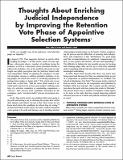|
Reseña:
|
Reseña:n August 1979, Time magazine featured an article titled,“Judging the Judges.”3 In that article, nearly 30 years ago,was a discussion about a number of problems facing thejudiciary as well as a discussion about potential reforms toaddress the problems. One of the problems discussed at somelength was public perception that the judiciary lacked sufficientimpartiality. While recognizing the emergence of judicialdiscipline systems to address partiality problems of sittingjudges, the article also noted “a convincing argument forgetting better judges to begin with.”4 The article also recognizedthat, at that time, “half the states [had] turned to socalledmerit selection for at least some judges” utilizing sometype of a selection committee or nominating commission, a“selector” who chooses from candidates forwarded by thecommittee, and a “retention ballot” process of retention elections.5As the Time article noted, one problem with voters going tothe polls and having a say in choosing the people who resolvetheir disputes and enforce the law is that “most voters do notknow much about the candidates for whom they are voting.”6As discussed below in this article, the same could be said aboutvoters going to the polls and having a say in deciding whetherIn August 1979, Time magazine featured an article titled,“Judging the Judges.” In that article, nearly 30 years ago,was a discussion about a number of problems facing thejudiciary as well as a discussion about potential reforms toaddress the problems. One of the problems discussed at somelength was public perception that the judiciary lacked sufficientimpartiality. While recognizing the emergence of judicialdiscipline systems to address partiality problems of sittingjudges, the article also noted “a convincing argument forgetting better judges to begin with.” The article also recognizedthat, at that time, “half the states [had] turned to socalledmerit selection for at least some judges” utilizing sometype of a selection committee or nominating commission, a“selector” who chooses from candidates forwarded by thecommittee, and a “retention ballot” process of retention elections. As the Time article noted, one problem with voters going tothe polls and having a say in choosing the people who resolvetheir disputes and enforce the law is that “most voters do notknow much about the candidates for whom they are voting.”As discussed below in this article, the same could be said aboutvoters going to the polls and having a say in deciding whethersitting judges should remain on the bench. Further complicatingthe process and the difficulties of ensuring both independenceand competence is that “[d]efinitions of a good judgeread like recommendations for sainthood: compassionate yetfirm, at once patient and decisive, all wise and upstanding.”The difficulty in finding the best possible process for locatingand retaining judges who can live up to such lofty standardsmakes examining judicial selection and retention an especiallymeaningful undertaking. In 2005, almost three decades after these very issues werebeing raised and discussed in Time, we examined them as partof a symposium on Judicial Independence at Fordham LawSchool in Manhattan, New York. The present article is derivedfrom an article, written for the symposium (and published inFordham Urban Law Journal), that contains specific informationabout the merit selection system that exists in Nebraska.The present article notes a number of examples of what appearto be steps in the right direction toward improving judicialselection processes as a whole and judicial retention processesas a part. |

